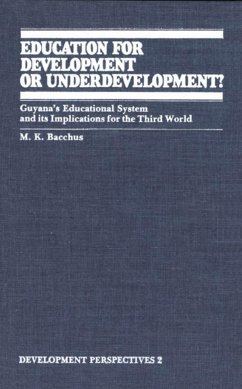How critical is education in the development struggle of a third world country? Responding to popular demands for more accessible education, the Guyanese government instituted numerous educational reforms, hoping to promote economic growth in both the modern and the traditional sectors of the economy. Many in the traditional sector, however, saw education as a means of economic advancement, and sought increasingly to move into higher social strata through employment in the modern sector. Consequently, the civil service and private firms gained an oversupply of personnel, while agriculture and small business suffered, and unemployment increased. The author examines Guyana's educational system from historical, political, social, and economic perspectives, and draws implications for other developing countries.
Bitte wählen Sie Ihr Anliegen aus.
Rechnungen
Retourenschein anfordern
Bestellstatus
Storno








